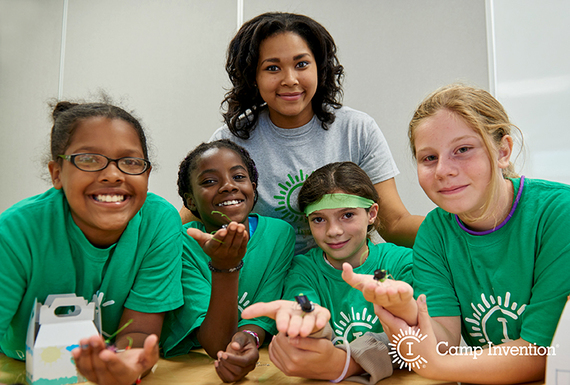I sat with my jaw hanging open as the floor vibrated and robotic arms with lasers painted virtual windows, doors and headlights onto a 3D-printed model Ford F-150 that emerged from a hidden platform. My team from Camp Invention and I were in the Manufacturing Innovation Theater, featured as part of the Ford Rouge Factory Tour in Dearborn, Michigan.
As we toured the Rouge, I watched in awe as robots picked up windshields and swooped them onto each truck with extreme precision. People worked alongside these bots so seamlessly, I imagined them going out to eat together at the end of a long shift. These relationships were only rivaled by the sense of teamwork that was highly evident amongst fellow line members. The culture undoubtedly reflects the legacy left by National Inventors Hall of Fame Inductee Henry Ford and the values that continue to be cultivated by his great grandson, Bill Ford, Executive Chairman of Ford Motor Company.
Observing the explicit and direct application of STEM (Science, Technology, Engineering, and Mathematics) skills throughout the facility caused me to reflect on how we are readying youth for the 21st century workforce. My mind went straight to the high school students we engage as Leadership Interns in our Camp Invention programs. The immersive Factory Tour elements validated the critical need for these students to be building STEM and teaming skills, through a program of this nature, in order to be successful in the future workplace. These points were well articulated by Alison Bazil, Manager of Global Learning and Development for PD and Quality, just moments before we entered the theater.
Alison highlighted the disparate numbers between the need for STEM-trained autoworkers and the number of women and minority engineers trained and interested in the auto industry. She referred back to hands-on science experiences in her youth that inspired her to pursue a path in mechanical engineering. The personal knowledge of the power of these types of experiences has motivated Alison and her team at Ford to invest in a partnership with Camp Invention, in order to get STEM into the hands of 120,000+ youth around the country each summer.
Echoing the sentiments of so many of the National Inventors Hall of Fame Inductees, it was encouraging to hear Alison speak about the importance of curiosity and the ability to problem solve as key characteristics that Ford is looking for in its employees. She also stressed the critical need for teaming skills in their workers. In fact, the ability to work well with others sounded just as important as coming to the table with strong STEM skills.
In a recent Nature article, "To Build a Scientist," global thought leaders were asked to share their insights on educating scientists. Robert Tjian, President of the Howard Hughes Medical Institute, stated "...something that we in the scientific community have not confronted very well is how to get [students] to focus on interacting productively with other people. Learning to manage teams and to work with others is going to become more important as science becomes more collaborative."
This past summer, thousands of teens around the country earned 40 hours of community service, as they learned to productively manage teams and foster collaboration under the mentorship of certified educators. These teens served as Leadership Interns at more than 1,300 Camp Invention sites across the nation.
The Leadership Intern application process gives youth the opportunity to practice articulating their goals and ambitions, as is expected on college scholarship and admission applications. Upon acceptance, Leadership Interns begin to P.I.L.O.T.™ their leadership skills, as they engage in Professional, Intellectual Property, and Leadership Online Training™. In addition to training to facilitate youth, these Interns also prepare to coach their successors, the Counselors-in-Training. At the successful completion of their volunteer service, they receive a formal letter from the United States Patent and Trademark Office.
Leadership Interns in Camp Invention programs facilitate youth in diverging and converging around invention design plans, agreeing on goals and objectives, taking on various team roles and job descriptions, and navigating problem-solving style differences. These experiences build their STEM leadership skills in a meaningful and authentic manner.
As we piloted our 2016 national Camp Invention program in Tacoma, Washington this past summer, I was highly impressed with the emotional intelligence of one of the Leadership Interns, Adam, who helped a team navigate tension around prototyping their design plans.
Adam participated in Camp Invention as an elementary student, moved into the Counselor-in-Training position in 7th and 8th grades, and then applied and was accepted to be a Leadership Intern as a high school student. He shared, "When leading others, it is important to be able to express specific ideas efficiently and clearly to others. As a leader it is important to be able to solve issues that might develop in the group that you are in charge of managing."
Should Adam choose to pursue a STEM career, his leadership skill-building experiences will help give him the competitive edge that will put his resume at the top of the pile. In the meantime, we can't wait to see him back at Camp Invention next summer!
